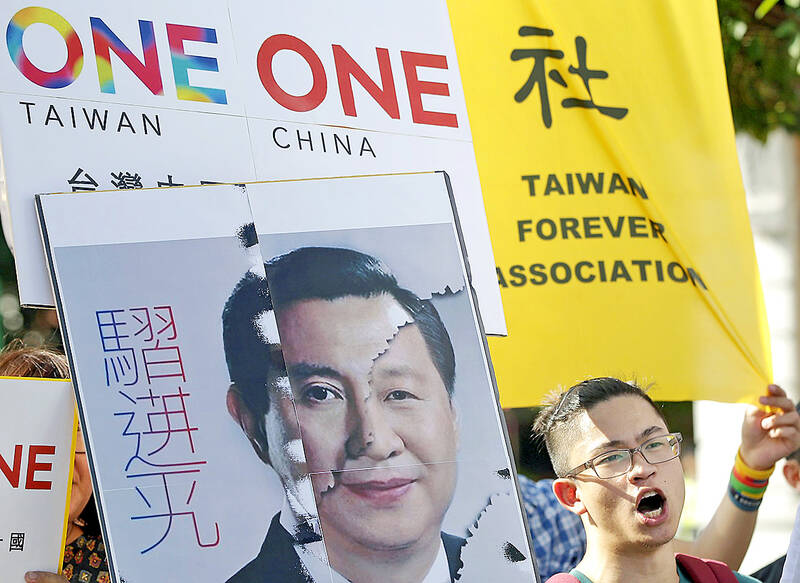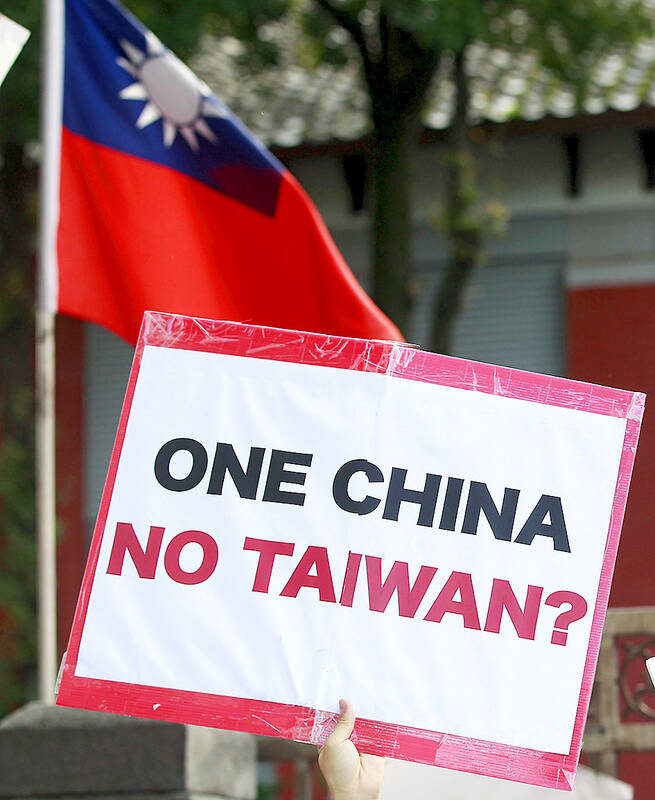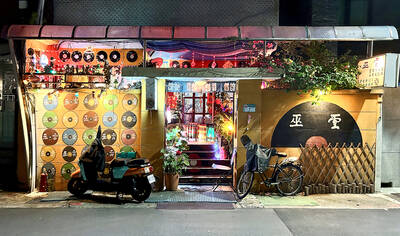Probable Chinese Nationalist Party (KMT) presidential candidate and New Taipei City Mayor Hou You-yi (侯友宜) went off to Singapore last week. Hou, who thus far has avoided public statements of specifics, announced several themes in this trip that may well shape his election campaign.
Hou said he was going to practice “international diplomacy.” He promised visits to Nanyang University because of its importance to technology start-ups and government and city departments, and that he would host a symposium “to demystify how Singaporean youth create their own world.” Four female officials would accompany him to symbolize gender equality, and he would meet with Singaporean officials to discuss “sustainable development, urban economics and culture.”
As he was leaving, he posted on Twitter, saying that New Taipei City “learns from Singapore’s success in tech, finance and youth startup to seek economic revival in post-pandemic era. Everyone’s a diplomat, New Taipei leading, ROC (Taiwan) plays a key global role.”

Photo: Reuters
All the buzzwords are there: sustainability, gender equality, culture, youth. Hou knows his audiences. And of course, he was off to Singapore, where former president Ma Ying-jeou (馬英九) famously shook the hand of PRC dictator Xi Jin-ping (習近平) in a now-forgotten meeting in 2015.
Hou’s comments echoed these remarks: “Singapore is different from us (Taiwan) as its emphasis is not on democratization. Nevertheless, it is professional, corruption-free and efficient, which is worth our learning.”
Recognize them? Those were Ma’s comments from his visit to the city-state in June of 2007. Implementing Singapore in Taiwan has long been a KMT dream. If only that pesky democratization thing hadn’t gotten in the way.

Photo courtesy of the Keelung City Government
Indeed, Ma complained about democratization at the time: “The Singapore Government is very efficient. They can reach consensus easily and there is no squabbling or fighting.”
In the minds of Ma’s generation of the KMT, “debate” is disunity and disobedience, while authoritarian rule is “efficient” because it short-circuits debate.
Hou has also echoed Ma in his description of his own identity. In late March he stated that “The Republic of China is my country and Taiwan is my home.”

Photo: Reuters
This is pure Ma Ying-jeou. In the run up to the 2008 and 2012 elections, Ma made similar statements.
In July of 2011, he wrote on his Facebook: “I am a descendant of the Yellow Emperor in blood and I identify with Taiwan in terms of my identity. I fight for Taiwan and I am Taiwanese. In nationality, I am a Republic of China [ROC] citizen and I am the president of the ROC.”
Ma’s opposition of “blood” to “identity” deprecates Taiwaneseness, which is a mere “identity” that overlays a Chinese essence. Ma has always treated “Taiwaneseness” as a subclass of Chineseness, attempting to position it as an interesting variant of Chineseness within the Greater Han identity, paying lip service to its uniqueness while gutting it of meaning.
Hou does not face the same problem of identity, because he is Taiwanese as we currently define it, while Ma was a Mainlander who was born in China and embraces an ROC Chinese identity. Indeed, when Ma was president, the Ministry of Education demanded that the Taiwanese language be referred to as “Minnan” and in 2013 sent around a circular ordering that the nation’s capital be identified as Nanjing.
Despite their differences, Hou must square the same circle that Ma did, positioning himself as a Taiwanese while affirming Taiwan as part of China and the ROC. Hou’s formulation cleverly positions Taiwan as a mere place within the larger ROC without expressly saying so.
On Facebook, for example, in discussing the trip to Singapore, Hou wrote that it would enable “the Republic of China and the land of Taiwan (中華民國以及台灣這片土地) to have more opportunities.” This not only subsumes Taiwan into the ROC, but tracks the KMT policy of getting locals to identify Taiwan with the ROC.
The numerous references to the “ROC” emphasized the “international” nature of Hou’s visit, but they also underlined for audiences here that “country” for Hou means the “ROC.”
In Hou’s remarks earlier this month in response to Hon Hai founder Terry Gou’s (郭台銘) announcement that he would try for the KMT nomination, Hou also used the formula “ROC, this nation, Taiwan, and this land.” This appears to be the language Hou is polishing for his presidential run.
Hou may be avoiding direct statements reflecting KMT positions, but his words closely align with the party line. Hou’s popularity has stemmed from his apparent opposition to the KMT mainstream, and his ability to tap into the current zeitgeist with appeals to individual values and democracy. The public may be starting to understand that he is simply restating standard KMT policies, which may account for his recently slumping poll numbers.
As presidential candidate, Hou will not be able to avoid discussing his stance by resorting to one of his cryptic utterances, like his comment in response to recent bribery accusations that “Taiwan guarantees free speech and is also a democratic country.”
KMT candidates all must overcome one stark fact: thus far Ma Ying-jeou is the only person opposed to Taiwan independence who has ever been elected president. He is the only template the party has for a successful presidential candidate. In the 2008 electorate Ma’s position might have been a reasonable compromise between the need to get elected and his own far right ideological beliefs, but the 2024 electorate is a much different electorate. Another template is needed.
Taiwan’s electorate is, as many of us have remarked, a post-independence electorate for whom the issue is not whether Taiwan is independent, but obtaining international recognition of its independence. It is also an electorate facing a much more threatening external environment, with worsening and more precarious long-term economic prospects.
At present, the KMT’s campaign appears to be a very basic “a vote for the Democratic Progressive Party (DPP) is a vote for war!” while the DPP is going to field the opposite line of “protect Taiwan.” These positions, as stereotyped as arguments in a bitter divorce, are out of date and the public knows it.
Hou has emphasized this commitment to protecting Taiwan in his public remarks. For example, in his response to Gou’s nomination run, Hou said that “everyone must be united” in protecting Taiwan. Such language could well outflank the DPP position, if people start believing his comments.
Despite the damage this might do to DPP chances, this might be a good thing, if it forces both candidates to switch to a discussion of the nation’s labor issues, immigration problems, salaries, housing prices and other urgent issues.
Or we could just spend months arguing about what “this land of Taiwan” really means.
Notes from Central Taiwan is a column written by long-term resident Michael Turton, who provides incisive commentary informed by three decades of living in and writing about his adoptive country. The views expressed here are his own.

The Lee (李) family migrated to Taiwan in trickles many decades ago. Born in Myanmar, they are ethnically Chinese and their first language is Yunnanese, from China’s Yunnan Province. Today, they run a cozy little restaurant in Taipei’s student stomping ground, near National Taiwan University (NTU), serving up a daily pre-selected menu that pays homage to their blended Yunnan-Burmese heritage, where lemongrass and curry leaves sit beside century egg and pickled woodear mushrooms. Wu Yun (巫雲) is more akin to a family home that has set up tables and chairs and welcomed strangers to cozy up and share a meal

Dec. 8 to Dec. 14 Chang-Lee Te-ho (張李德和) had her father’s words etched into stone as her personal motto: “Even as a woman, you should master at least one art.” She went on to excel in seven — classical poetry, lyrical poetry, calligraphy, painting, music, chess and embroidery — and was also a respected educator, charity organizer and provincial assemblywoman. Among her many monikers was “Poetry Mother” (詩媽). While her father Lee Chao-yuan’s (李昭元) phrasing reflected the social norms of the 1890s, it was relatively progressive for the time. He personally taught Chang-Lee the Chinese classics until she entered public

Last week writer Wei Lingling (魏玲靈) unloaded a remarkably conventional pro-China column in the Wall Street Journal (“From Bush’s Rebuke to Trump’s Whisper: Navigating a Geopolitical Flashpoint,” Dec 2, 2025). Wei alleged that in a phone call, US President Donald Trump advised Japanese Prime Minister Sanae Takaichi not to provoke the People’s Republic of China (PRC) over Taiwan. Wei’s claim was categorically denied by Japanese government sources. Trump’s call to Takaichi, Wei said, was just like the moment in 2003 when former US president George Bush stood next to former Chinese premier Wen Jia-bao (溫家寶) and criticized former president Chen

President William Lai (賴清德) has proposed a NT$1.25 trillion (US$40 billion) special eight-year budget that intends to bolster Taiwan’s national defense, with a “T-Dome” plan to create “an unassailable Taiwan, safeguarded by innovation and technology” as its centerpiece. This is an interesting test for the Chinese Nationalist Party (KMT), and how they handle it will likely provide some answers as to where the party currently stands. Naturally, the Lai administration and his Democratic Progressive Party (DPP) are for it, as are the Americans. The Chinese Communist Party (CCP) is not. The interests and agendas of those three are clear, but